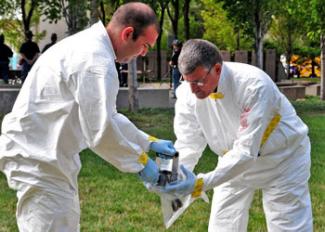Radiological Emergency Preparedness Program
Mission:
The Rhode Island Emergency Management Agency (RIEMA) Radiological Emergency Preparedness Program (REP Program) coordinates efforts to protect against and respond to incidents involving Millstone Nuclear Power Station located in Waterford, Connecticut.
The RIEMA REP Program follows federal guidance and policies to ensure capabilities exist to prevent, protect against, mitigate the effects of, respond to, and recover from these radiological incidents.
The Federal Emergency Management Agency (FEMA) REP Program provides state, local and tribal governments with plans, training, guidance, and policies related to commercial nuclear power plant incidents.
Purpose:
Portions of Rhode Island are within the 50-mile Ingestion Exposure Pathway emergency planning zone (EPZ) of the Millstone Nuclear Power Station. An EPZ is a geographical area surrounding a commercial nuclear power plant for which specialized emergency planning is needed.
The Nuclear Regulatory Commission (NRC) is responsible for the on-site emergency preparedness at all U.S. Nuclear Power Plants. FEMA has the lead role for off-site emergency planning and preparedness.
Participation in REP planning and preparedness adheres to the program requirements in 44 CFR Part 350 and the joint NRC/FEMA document NUREG 0654/FEMA-REP-1, as well as and the FEMA REP Program Manual. The REP Program Manual has specific planning standards outlined that apply to regulated entities, states, and communities. FEMA must review and evaluate state and local radiological emergency plans and preparedness measures. This oversight ensures reasonable assurance that appropriate protective measures to protect the health and safety of the public can be taken off-site in the event of a radiological incident.
NRC Emergency Classification System
The NRC has established an emergency classification system that indicates the level of risk to the public. There are four Emergency Classification Levels (ECLs):
- Notification of Unusual Event: A situation is in progress or already completed which could potentially degrade the plant's level of safety or indicate a security threat to the facility. No releases of radioactive material requiring offsite actions are expected unless safety systems degrade further.
- Alert: Events are in progress or have occurred which have (or could) substantially degrade the plant safety; or, a security event that could threaten site personnel or damage to site equipment is in progress. Any offsite releases of radioactive material that could occur are expected to be minimal and far below limits established by the Environmental Protection Agency's (EPA) protective action guides (PAGs).
- Site Area Emergency: Events are in progress or have occurred which have caused (or likely will cause) major failures of plant functions that protect the public, or involve security events with intentional damage or malicious acts that could lead to the likely failure of (or prevent effective access to) equipment needed to protect the public. Any offsite releases of radioactive material are expected to remain below EPA PAG exposure levels beyond the site boundary.
- General Emergency: Events are in progress or have occurred which: a) have caused (or shortly will cause) substantial reactor core damage, with the potential for uncontrolled releases of radioactive material; or, b) involve security events that deny plant staff physical control of the facility. Offsite releases can be reasonably expected to exceed EPA PAG exposure levels beyond the plant site.
Ingestion Pathway Preparation and Planning:
During a radiological emergency, state agencies will dispatch teams to collect a variety of samples and conduct tests to determine if contamination is present. If food and water become contaminated, some protective actions may be necessary. Specific information and instructions to carry out these actions, if required, will be provided through the Emergency Alert System (EAS) announcements and news releases from the Governor.
The RIEMA REP Program provides training and education regarding nuclear power plants and the ingestion pathway, including the basic effects of radiation and identification of possible preventative protective actions taken for food and water. FEMA evaluated exercises for the Ingestion Pathway Emergency Planning Zone are conducted every eight years.
The following 26 Municipalities in Rhode Island are in part or whole within the 50-mile EPZ:
- Burrillville
- Charlestown
- Coventry
- Cranston
- East Greenwich
- Exeter
- Foster
- Glocester
- Hopkinton
- Jamestown
- Johnston
- Middletown
- Narragansett
- Newport
- New Shoreham
- North Kingstown
- Portsmouth
- Providence
- Richmond
- Scituate
- Smithfield
- South Kingstown
- Warwick
- Westerly
- West Greenwich
- West Warwick

Additional Resources
U.S. Nuclear Regulatory Commission Information
Radiation Protection Information
Fact Sheets
Information Digest NPP)
Federal Emergency Management Agency (FEMA) Information
Radiological Emergency Preparedness
Rhode Island Agricultural Information
Radiological Emergency Emergency Information for Rhode Island's Agricultural Community
